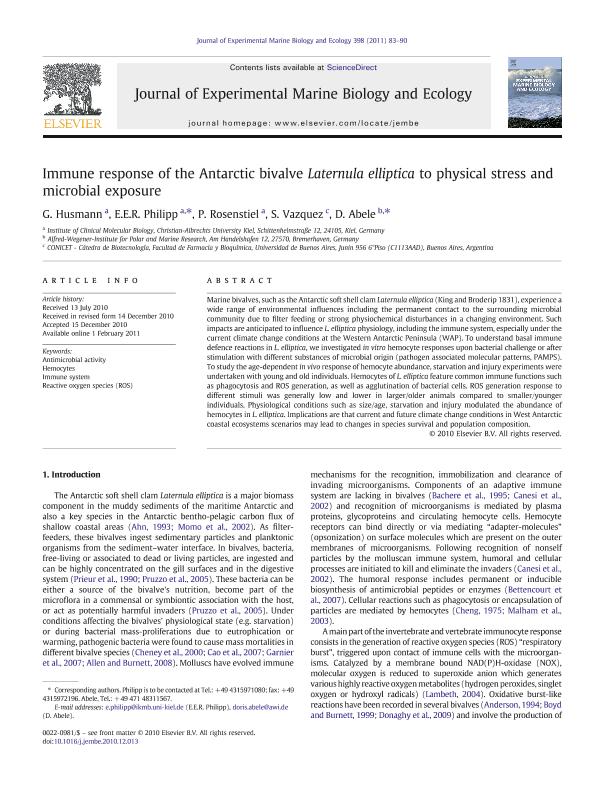Mostrar el registro sencillo del ítem
dc.contributor.author
Husmann, G.
dc.contributor.author
Philipp, E. E. R.
dc.contributor.author
Rosenstiel, P.
dc.contributor.author
Vázquez, Susana Claudia

dc.contributor.author
Abele, D.
dc.date.available
2023-03-29T16:08:47Z
dc.date.issued
2011-02
dc.identifier.citation
Husmann, G.; Philipp, E. E. R.; Rosenstiel, P.; Vázquez, Susana Claudia; Abele, D.; Immune response of the Antarctic bivalve Laternula elliptica to physical stress and microbial exposure; Elsevier Science; Journal of Experimental Marine Biology and Ecology; 398; 1-2; 2-2011; 83-90
dc.identifier.issn
0022-0981
dc.identifier.uri
http://hdl.handle.net/11336/192060
dc.description.abstract
Marine bivalves, such as the Antarctic soft shell clam Laternula elliptica (King and Broderip 1831), experience a wide range of environmental influences including the permanent contact to the surrounding microbial community due to filter feeding or strong physiochemical disturbances in a changing environment. Such impacts are anticipated to influence L. elliptica physiology, including the immune system, especially under the current climate change conditions at the Western Antarctic Peninsula (WAP). To understand basal immune defence reactions in L. elliptica, we investigated in vitro hemocyte responses upon bacterial challenge or after stimulation with different substances of microbial origin (pathogen associated molecular patterns, PAMPS). To study the age-dependent in vivo response of hemocyte abundance, starvation and injury experiments were undertaken with young and old individuals. Hemocytes of L. elliptica feature common immune functions such as phagocytosis and ROS generation, as well as agglutination of bacterial cells. ROS generation response to different stimuli was generally low and lower in larger/older animals compared to smaller/younger individuals. Physiological conditions such as size/age, starvation and injury modulated the abundance of hemocytes in L. elliptica. Implications are that current and future climate change conditions in West Antarctic coastal ecosystems scenarios may lead to changes in species survival and population composition.
dc.format
application/pdf
dc.language.iso
eng
dc.publisher
Elsevier Science

dc.rights
info:eu-repo/semantics/openAccess
dc.rights.uri
https://creativecommons.org/licenses/by-nc-sa/2.5/ar/
dc.subject
ANTIMICROBIAL ACTIVITY
dc.subject
HEMOCYTES
dc.subject
IMMUNE SYSTEM
dc.subject
REACTIVE OXYGEN SPECIES (ROS)
dc.subject.classification
Biología Marina, Limnología

dc.subject.classification
Ciencias Biológicas

dc.subject.classification
CIENCIAS NATURALES Y EXACTAS

dc.title
Immune response of the Antarctic bivalve Laternula elliptica to physical stress and microbial exposure
dc.type
info:eu-repo/semantics/article
dc.type
info:ar-repo/semantics/artículo
dc.type
info:eu-repo/semantics/publishedVersion
dc.date.updated
2023-03-28T14:20:58Z
dc.journal.volume
398
dc.journal.number
1-2
dc.journal.pagination
83-90
dc.journal.pais
Países Bajos

dc.journal.ciudad
Amsterdam
dc.description.fil
Fil: Husmann, G.. Christian-Albrechts University Kiel; Alemania
dc.description.fil
Fil: Philipp, E. E. R.. Christian-Albrechts University Kiel; Alemania
dc.description.fil
Fil: Rosenstiel, P.. Christian-Albrechts University Kiel; Alemania
dc.description.fil
Fil: Vázquez, Susana Claudia. Universidad de Buenos Aires. Facultad de Farmacia y Bioquímica; Argentina. Consejo Nacional de Investigaciones Científicas y Técnicas; Argentina
dc.description.fil
Fil: Abele, D.. Alfred-Wegener-Institute for Polar and Marine Research; Alemania
dc.journal.title
Journal of Experimental Marine Biology and Ecology

dc.relation.alternativeid
info:eu-repo/semantics/altIdentifier/url/https://www.sciencedirect.com/science/article/abs/pii/S0022098110005125
dc.relation.alternativeid
info:eu-repo/semantics/altIdentifier/doi/http://dx.doi.org/10.1016/j.jembe.2010.12.013
Archivos asociados
